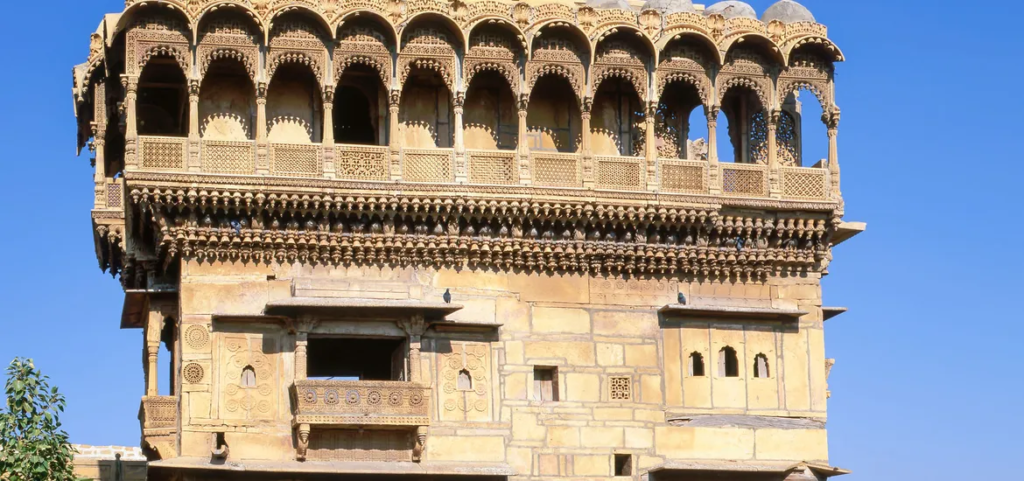Salim Singh Ki Haveli: Unraveling the Legacy of Jaisalmer’s Iconic Mansion

Patwon Ki Haveli Jaisalmer – A Journey Through Art and Time
July 19, 2025
Experience Spiritual Bliss at Tanot Mata Temple in 2025
August 2, 2025Located in the heart of the golden city, salim singh ki haveli jaisalmer stands as one of the most remarkable architectural marvels in Rajasthan. Often referred to as this haveli is not just a beautiful building but a tale carved in yellow sandstone. The grandeur, mystery, and history surrounding salim singh ki haveli captivate every traveler that steps into its intricately designed corridors. For those planning a complete cultural experience in the region, pairing a visit to this historic mansion with a stay at the Best Desert Camp in Jaisalmer offers an unforgettable glimpse into the royal and rustic charm of Rajasthan.
Salim Singh, the man behind the construction of this mansion, was no ordinary figure. He was known for his ambition, political influence, and controversial rule. Today, his name lives on through the awe-inspiring salim singh ki haveli jaisalmer, a mansion that still whispers stories of power, beauty, and mystery.

The Man Behind the Mansion: Who Was Salim Singh?
To truly understand salim singh ki haveli jaisalmer, we must begin with its creator, salim singh. Serving as the prime minister of Jaisalmer in the early 19th century, salim singh was both admired and feared. His bold nature and desire to centralize power put him at odds with the royal family. However, his influence over the administration and people was undeniable.
Salim Singh was determined to leave a mark on Jaisalmer, and he chose architecture as his legacy. Thus, the iconic salim singh ki haveli
Salim Singh Ki Haveli History
Salim Singh Ki Haveli was constructed in the year 1815 by Salim Singh, who served as the prime minister when Jaisalmer was the capital of the kingdom. What sets this mansion apart is its construction technique—unlike typical buildings, it was built without the use of cement or mortar. Instead, the stones are firmly joined using robust iron rods, showcasing advanced engineering for its time.
The haveli is widely admired for its exceptional architecture, featuring 38 beautifully carved balconies, each with a unique design. Inspired by the form of a dancing peacock, the structure reflects grace and elegance. Considered one of the most ambitious and grand constructions of its era, Salim Singh Ki Haveli was so stunning that it reportedly aroused envy in the royal court during its time
Architecture of Salim Singh Ki Haveli Jaisalmer
The salim singh ki haveli jaisalmer is a shining example of Rajasthani architecture blended with Mughal and Persian aesthetics. Built in 1815, this haveli is unique in its design, especially the roof, which is shaped like a peacock. Unlike any other haveli in the region, salim singh ki haveli showcases a fusion of creativity, cultural symbolism, and fine craftsmanship.
With 38 intricately carved balconies, each one different from the other, the façade is an architectural wonder. The arched roofs and ornamental columns make it stand apart from other historical buildings in the region.
Visitors to salim singh ki haveli jaisalmer are often drawn to its narrow passageways, hidden courtyards, and stunning terrace views. The top floor of salim singh ki haveli offers a panoramic view of the Jaisalmer city, giving a perfect glimpse into the Thar Desert and the majestic Jaisalmer Fort.
The Legacy and Mystery of Salim Singh Ki Haveli
Legends and myths are an essential part of salim singh ki haveli jaisalmer. According to local tales, salim singh intended the haveli to be the most impressive structure in Jaisalmer—even more magnificent than the royal palace. It is said that he desired the haveli’s height to match or surpass the king’s residence. This ambition angered the royal family and led to political tensions.
Some versions of the story claim that the top floors were partially dismantled on the king’s orders, fearing salim singh’s growing power. Whether or not these tales are true, they have added an air of mystery to salim singh ki haveli that still intrigues historians and visitors alike.
Exploring the Interior of Salim Singh Ki Haveli
Step inside salim singh ki haveli jaisalmer, and you’re immediately transported to a different era. The interiors of salim singh ki haveli are adorned with frescoes, traditional paintings, and mirror work. The detailed carvings on the sandstone walls reflect the opulence that salim singh envisioned.
From the grand halls to the private chambers The ceilings are supported by finely sculpted brackets, and the corridors seem to echo the footsteps of history. Exploring the interior of salim singh ki haveli jaisalmer gives you a close look at how architecture was used as a symbol of power.
Cultural Importance of Salim Singh Ki Haveli Jaisalmer
Beyond its architectural grandeur, salim singh ki haveli plays an important role in the cultural narrative of Jaisalmer. It is a symbol of the city’s golden age and a reminder of the artistic brilliance of past generations. Tourists from across the globe visit salim singh ki haveli jaisalmer to witness this living monument of heritage.
The stories of salim singh, his eccentric rule, and his dream to surpass royalty add layers of drama to the haveli’s already fascinating legacy. salim singh has also become a favorite for filmmakers and photographers due to its unique structure and dramatic backdrop.

Connection to the Royal Court
Despite his controversial stance, salim singh was an integral part of the royal court of Jaisalmer. His administrative skills and ambition made him both a key player and a political threat. This duality is reflected in salim singh ki haveli, which stands as a symbol of individual brilliance but also of political defiance.
The location of salim singh ki haveli jaisalmer near the city center meant that salim singh was close to power—both literally and metaphorically. Even after his death, the mansion continued to serve as a historical checkpoint for researchers studying the political dynamics of Rajasthan.
The Influence of Mughal Architecture on Salim Singh Ki Haveli
One of the standout features of salim singh ki haveli jaisalmer is its Mughal-inspired arches and domes. Though deeply rooted in Rajputana style, the incorporation of Mughal motifs in salim singh ki haveli reveals the cultural exchanges that were common during that era.
From floral patterns to jharokhas (overhanging enclosed balconies), salim singh is a blend of regional craftsmanship and Mughal design. This amalgamation showcases how salim singh was not just a politician but also a visionary who embraced cultural diversity.
Salim Singh Ki Haveli Through the Eyes of Modern Travelers
Today, salim singh ki haveli jaisalmer is one of the most visited sites in the city. Visitors are enchanted not only by its beauty but also by the legends associated with salim singh. For many, a visit to salim singh ki haveli is an opportunity to explore a part of Jaisalmer that still feels untouched by time.
Modern travel influencers, bloggers, and history enthusiasts regard salim singh as a gem of desert architecture. Whether you’re into heritage walks or photography, salim singh ki haveli jaisalmer offers an experience unlike any other.
The Story of the Peacock-Shaped Roof
One of the most unique features of salim singh ki haveli is its peacock-shaped roof. Locals believe that salim singh had this roof designed to reflect beauty, strength, and grace—qualities he admired in himself and his rule.
The roof of salim singh ki haveli jaisalmer is symbolic, acting almost like a crown atop this magnificent structure. This distinct feature alone makes salim singh stand out from every other building in the region.
Preservation and Heritage Efforts
Preserving a structure as old and intricate as salim singh ki haveli jaisalmer is no easy task. The haveli, though partially occupied, is now maintained with the help of local heritage conservation groups. The sandstone carvings of salim singh ki haveli are fragile and require consistent care.
Due to its cultural significance, efforts are constantly being made to promote salim singh as a heritage tourism site. Travelers are encouraged to learn about salim singh, understand the architectural nuances, and respect the haveli’s historical value.
The Timeless Appeal of Salim Singh Ki Haveli
In a city filled with forts, temples, and golden sand, salim singh holds its ground as a unique destination. Its charm lies not only in its beauty but also in the story of salim singh—a man who dared to dream beyond boundaries.
Salim singh ki haveli jaisalmer is a celebration of vision, bravery, and architectural excellence. Every carving, balcony, and hallway of salim singh ki haveli echoes with the spirit of the man behind it.

Conclusion
To walk through salim singh ki haveli jaisalmer is to walk through history. Salim Singh, through his ambition and aesthetic vision, gifted the city one of its most iconic landmarks. Whether known as , salim singh ki haveli jaisalmer, or salaam palace, this mansion continues to capture hearts and inspire awe.As you explore the golden city of Jaisalmer, make sure to visit salim singh ki haveli —a timeless story carved in stone, where heritage whispers from every wall and salim singh’s legacy lives on forever. After soaking in the rich history, elevate your journey with some Thrilling Adventure Activities in Jaisalmer, which perfectly complement the cultural and historical experiences the city has to offer.
FAQS
What is the architecture of Salim Singh Ki Haveli?
The Haveli is made of sandstone and boasts a unique blend of Rajput and Islamic architectural styles. The intricate carvings and designs on the walls, pillars, and ceilings of Salim Singh Ki Haveli reflect the creativity and craftsmanship of the artisans who built this palace.
What is the architecture of Havelis of Jaisalmer?
The Nathmal ki Haveli and Salim Singh ki Haveli are other must-visit havelis in the city. The Jain Temples of Jaisalmer are another architectural marvel that attracts visitors to the city. Built-in the 12th and 15th centuries, these temples are known for their intricate carvings and sculptures.
What is the history of Salim Singh Jaisalmer?
At one point, Jaisalmer was the capital of Rajasthan, and the prime minister in 1815 was Salim Singh. He created a mansion with distinctive architecture, making the haveli a must-visit place. Interestingly, the legend has it that Salim Singh was not a very nice person.
What is the ticket price of Salim Singh Ki Haveli?
Entry Fee: INR 20 (Indian) INR 100 (Foreigner)
What do you know about havelis?
A haveli is a traditional mansion or grand residence found in India. It serves as a testament to the opulence and architectural finesse of bygone eras. Havelis are characterized by their stunning facades, intricate carvings, and sprawling courtyards
Which sweet is famous in Jaisalmer?
And if you are ever visiting Jaisalmer, this is the shop where you have to try it all. Dhanraj Ranmal Bhatia is famous for a local sweet called Ghotua, which is made with gram flour, ghee and sugar.




